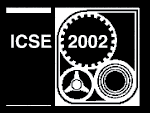 |
|
 |
Home
Conference Updates
Advance Program
Overview
Technical Papers
Conference Keynotes
Tutorials
Workshops
Industry Presentations
State-of-the-Art Presentations
Doctoral Symposium
IMPACT Presentations
Panels
Co-Located Events
Posters and Demos
Exhibitors
Call For Participation
Types of Submissions
Student Volunteers
Conference Calendar
Program At-A-Glance!
Conference Meetings
Conference Information
Conference Committee
Program Committee
Sponsors and Supporters
Advice for Newcomers
Registration
Overview
Travel Information and Events
Overview
Conference Hotel
Discount Airfares
Discount Airport Shuttle
Discount Theme Park Tickets
Securing a Visa
Spouse Program
ICSE 5K Run
Related Conferences
Other ICSE Conferences
Types of ICSE 2002 Papers
The four primary categories of papers are grouped into sets that will be published and identified separately in the conference proceedings.
1 Research Contributions
1.1 Theory Papers
Theory Papers describe principles, concepts, or models on which work in Software Engineering might be based; authors of theoretical papers are expected to position their ideas within a broad context of Software Engineering frameworks and theories. Review criteria include the originality and soundness of the analysis provided, as well as the relevance of the theoretical content to Software Engineering practice and/or research.
1.2 Systems Papers
Systems Papers describe novel technology for any aspect of software engineering. Review criteria include the originality and relevance of the system's architecture and behavior with respect to the existing state-of-the-art. Authors should be clear to what extent the system has been implemented and applied in practical circumstances.
1.3 Empirical Papers
Empirical Papers describe the collection and interpretation of data concerning the use of software engineering methods, techniques, and tools. Data might include interviews, observations, surveys, or experimental manipulations. Both qualitative and quantitative approaches to data collection and analysis are welcome. Review criteria include the appropriateness and rationale for the methods of data collection and analysis, and the significance of the conclusions for practice or research in Software Engineering.
2 Experience Reports
Experience Papers describe the application of software engineering methods, theory or tools to the development of significant software products. Review criteria include the value of the reflections abstracted from the experience and their relevance to other designers or to researchers working on related methods, theory or tools.
3. Opinion Papers
Opinion papers present the author's well-supported opinion about some aspect of Software Engineering. Review criteria include the impact and quality of the argumentation, including the experience (research or practice) used to support the opinion. Authors are advised that these criteria are difficult to satisfy, and as a consequence ICSE rarely accepts opinion papers.
4. Education Papers
Papers describing innovative approaches and significant work in software engineering education and training are invited. They should focus on ensuring that the results they present can be picked up and used by others.
Quality
For an ICSE submission to be accepted you must say something significant and relevant to an audience of software engineering researchers and practitioners. Authors who are unfamiliar with ICSE are strongly encouraged to read papers from past ICSE conferences and papers in other leading software engineering journals and conferences. All submissions should address the following:
Content
- State your message clearly.
- What research methods did you use, and why?
- What are your findings or what are the issues? Be specific regarding the status of any software systems discussed.
- Review the literature carefully. Please read and cite relevant material from previous ICSE Proceedings, journals, and other conference proceedings.
- Identify the innovative aspects of your work clearly.
Consequences
- What should the audience do differently if and when they have accepted your message?
- What are the directions for future work based on your work?
Language of the Conference
The written and spoken language of ICSE 2002 is English.


